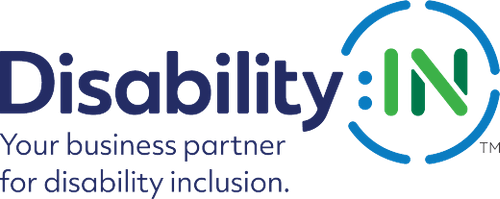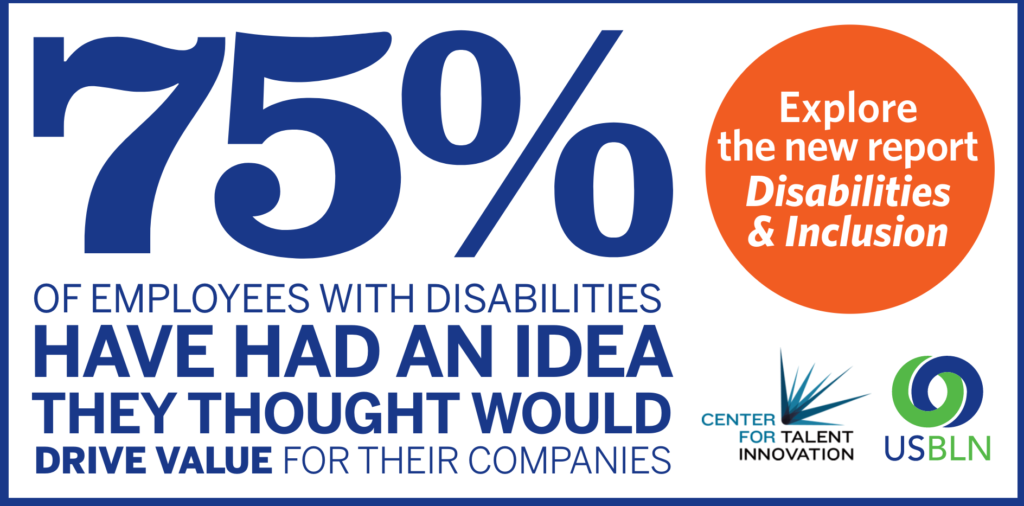USBLN Proudly Sponsors A Breakthrough Report On Disabilities And Inclusion From The Center for Talent Innovation
As many as 30% of full-time, college-educated professionals in the U.S. have a disability. That’s the finding from a first-of-its-kind study published today by the Center for Talent Innovation (CTI), and sponsored by the USBLN.
USBLN’s sponsorship was generously supported by: 3M, General Motors, McKesson, Merck, Microsoft, and Walgreens Boots Alliance.
Using the new, broader definition of disabilities, which as of last year includes mental health and chronic conditions, the CTI’s report, entitled Disabilities and Inclusion, uncovered enlightening information about employees with disabilities and the impact that information has on their employers. For example:
- Sixty-two percent of employees with disabilities have “invisible disabilities,” meaning people can’t tell they have a disability upon meeting them.
- Only 21% of employees with disabilities disclose them to their employers’ human resources departments.
- Seventy-five percent of employees with disabilities report having innovative ideas that would drive value for their company.
- Forty-eight percent of those same employees report that their ideas did not win endorsement from people with the power to act on them.
- Employees with disabilities report experiencing negative bias in the workplace, and feeling stalled in their careers.
The implication of the research for companies is clear. Invisibility and a lack of awareness about such a high percentage of their workforce translates into a loss of opportunity, and potentially a loss of revenue for employers. Employees with disabilities make up an enormous talent pool, but remain under the radar. Employers who want to elicit the best ideas from their staff, including those with disabilities, should rely on inclusive leadership.
With people with disabilities making up 1/3 of the professional workforce, it’s imperative for employers to find ways to cultivate their potential. The CTI’s Disabilities and Inclusion report highlights ways employers can nurture inclusion in the workplace. Creating an environment where employees with disabilities feel safe enough to propose novel ideas; feel like those ideas are being heard; and are receiving actionable feedback is the first step. Establishing a relationship with organizations like USBLN also promotes a commitment to disability inclusion.
For more information on Disabilities and Inclusion, please visit www.talentinnovation.org.
Disability:IN reveals new research that says millennials want disability inclusion
[Download PDF version]
USBLN – A Leading Nonprofit for Disability Inclusion – Rebrands to Disability:IN, Publishes Survey Data on Millennial Job Priorities
Survey shows millennial employees prioritize diversity and inclusion when selecting, remaining at jobs; yet only half believe their employer is committed to hiring, retaining people with disabilities.
126 Major Businesses Rated “Best Places to Work for Disability Inclusion”
Fortune 1000 Corporations are recognized as a part of the 2018 Disability Equality Index (DEI) and honored as the “Best Places to Work for Disability Inclusion”.
5 Ways to Participate in Global Accessibility Awareness Day #GAAD
On May 17th, the USBLN will be celebrating Global Accessibility Awareness Day (GAAD). GAAD was established to create awareness and generate conversations about accessibility, specifically web accessibility, for people with disabilities.
USBLN Facilitates Over 8,000 New Hires with Disabilities Through Going for the Gold Program
Through the Going for the Gold (GFG) program, the USBLN is aiding 20 Fortune and Global 500 companies achieve the “gold standard” in hiring and fully including individuals with disabilities in their workforces.

